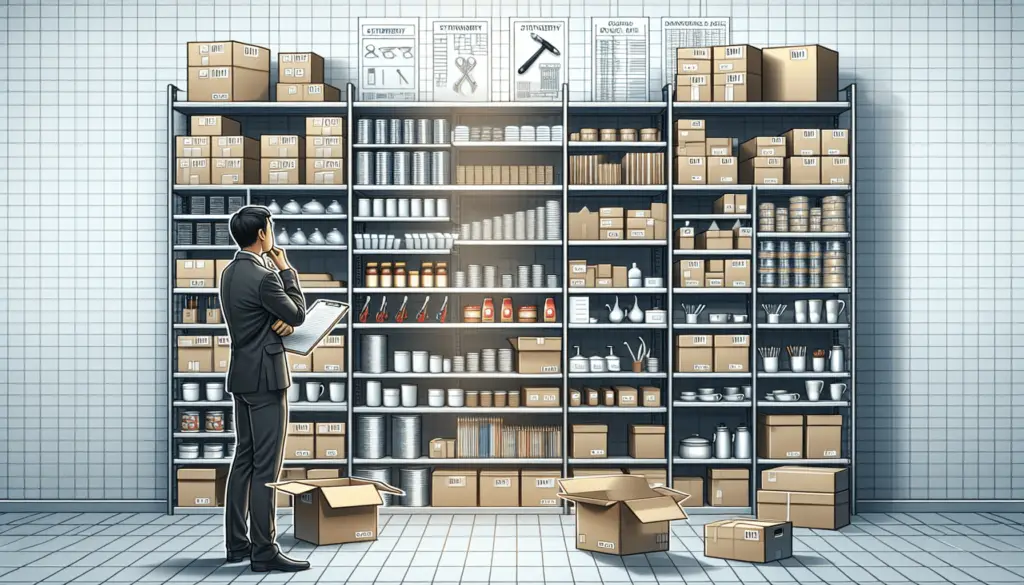Hey there! Are you struggling with finding the perfect storage location for all your supplies? Fret no more! In this article, we will explore some valuable tips and tricks on how to choose the right storage location that will meet all your needs. From considering accessibility and temperature control to evaluating security and organization options, we’ve got you covered. So, let’s dive in and make sure you find the ideal spot for your supplies!

Consider the Nature of Your Supplies
When choosing a storage location for your supplies, it is important to first consider the nature of the items you are storing. Determine the type of supplies you have, whether they are perishable, fragile, or require specific handling. This will help you choose a storage facility that can meet the unique requirements of your supplies.
Evaluate the storage requirements of your supplies. Some items may require climate-controlled storage to maintain their quality and integrity. Others may require specialized handling or storage conditions, such as keeping them upright or in a specific orientation. Taking the time to carefully assess the storage requirements of your supplies will ensure that you choose a storage location that can adequately accommodate them.
Consider the sensitivity of your supplies to environmental factors such as temperature, humidity, and sunlight. Some supplies may be sensitive to extreme heat or cold, while others may deteriorate if exposed to moisture or direct sunlight. Understanding the sensitivity of your supplies to these factors will help you choose a storage location that can provide the necessary environmental controls to protect them.
Assess the Available Space
Once you have considered the nature of your supplies, it is important to assess the available space in potential storage locations. Measure the dimensions of the storage area to ensure that it can comfortably accommodate the size of your supplies. Consider the height limitations of the storage space, especially if you have items that require vertical stacking or if you plan to use racks or shelving for organization.
In addition to the overall dimensions of the storage area, consider the available floor space. This will determine how much space you have for storage units, racks, or other organizational systems. Adequate floor space is essential for easy access to your supplies and efficient inventory management.
Evaluate Accessibility and Convenience
Accessibility and convenience are key factors to consider when choosing a storage location for your supplies. Assess the frequency of access to your supplies. If you need to retrieve items frequently or on short notice, it is important to choose a storage facility that offers easy and convenient access.
Consider the ease of reaching your supplies within the storage location. Is there ample aisle space for maneuvering? Are items placed in a logical and organized manner? Choosing a storage facility that offers easy access to your supplies will save you time and frustration when retrieving items.
Evaluate the need for specialized equipment. Some supplies may require the use of specific equipment or machinery for retrieval or storage. If this applies to your supplies, choose a storage location that can accommodate the necessary equipment and provide appropriate resources.
Consider Security Measures
Security should be a top priority when choosing a storage location for your supplies. Assess the level of security required for your items. Some supplies may be valuable or sensitive, requiring higher levels of security to protect against theft or damage. Consider the overall value and vulnerability of your supplies to determine the appropriate level of security needed.
Evaluate the effectiveness of the storage location’s security features. Does it have a reliable alarm system, surveillance cameras, or secure access controls? Consider the reputation and track record of the storage facility in terms of security incidents. Choosing a storage location with strong security measures will give you peace of mind knowing that your supplies are safe and protected.

Assess Environmental Factors
Environmental factors can greatly impact the quality and longevity of your supplies. Evaluate the temperature and humidity control capabilities of potential storage locations. Some supplies may require specific temperature or humidity ranges to prevent spoilage or deterioration. Choose a storage facility that can provide the necessary environmental controls to maintain the integrity of your supplies.
Consider ventilation and air quality within the storage location. Poor air circulation or high levels of dust or pollutants can affect the condition of your supplies. Assess the storage facility for proper ventilation systems and cleanliness to ensure optimal air quality for your supplies.
Assess the risk of pests or mold growth. Some storage locations may be more prone to pests or have higher humidity levels, increasing the risk of damage to your supplies. Choose a storage facility that has pest control measures in place and takes proactive steps to prevent mold or mildew growth.
Evaluate Potential Hazards
Before making a decision on a storage location, it is crucial to identify and evaluate potential hazards within the storage area. Assess the risk of fire or water damage. Is the storage location equipped with fire suppression systems, such as sprinklers or extinguishers? Are there measures in place to protect against water leaks or flooding? Choosing a storage facility that has appropriate safeguards against these hazards will minimize the risk to your supplies.
Consider the presence of hazardous materials nearby. If the storage location is in close proximity to potentially hazardous materials, there may be an increased risk of contamination or damage to your supplies. Evaluate the potential risks and choose a storage facility that minimizes exposure to these hazards.
Take Inventory Management into Account
Efficient inventory management is essential for any business. Consider the need for organized storage within the chosen location. Does it provide shelving, racks, or other organizational systems? Having a well-organized storage location will make it easier to locate and manage your supplies, saving you valuable time and effort.
Evaluate the scalability of the storage location. If your business grows or your storage needs change, will the location be able to accommodate your expanding inventory? Choosing a storage facility that allows for easy scalability will save you from the hassle of having to move your supplies to a new location in the future.
Assess the potential for implementing inventory control systems. Some storage facilities offer technology solutions, such as barcode scanning or tracking software, to help you efficiently manage your inventory. Consider whether these features align with your inventory management needs and goals.
Evaluate Cost and Budget
Cost and budget are important factors to consider when choosing a storage location. Consider the cost and affordability of the storage facility. Compare the prices offered by different providers and ensure that they align with your budget.
Evaluate any additional expenses associated with the storage location. Some facilities may require payment for maintenance or insurance coverage. Consider these additional costs when assessing the overall affordability of the storage location.
Assess the long-term value and return on investment. While it may be tempting to choose the cheapest storage option, it is important to consider the value that the storage location offers. A slightly higher cost may be justified if the facility provides superior security, environmental controls, or organizational systems that will ultimately protect and preserve the value of your supplies.
Consider Proximity and Transportation
The proximity of the storage location to your operations is a crucial factor to consider. Evaluate how close the storage facility is to your business or work location. Choosing a storage location that is conveniently located will save you time and transportation costs when accessing your supplies.
Consider the ease of transportation for your supplies. Assess whether the storage location has adequate parking or loading docks to facilitate the loading and unloading of your items. Easy access to these facilities will streamline the transportation process and make it more efficient.
Assess the availability of loading docks or other necessary facilities. Depending on the size and weight of your supplies, you may require specific infrastructure to facilitate transportation. Evaluate whether the storage location has the necessary facilities to accommodate your transportation needs.
Seek Professional Advice
When in doubt, seek professional advice. Consult specialists or experts in storage management. They can provide valuable insights and recommendations based on their knowledge and experience. Their expertise will help you make an informed decision when choosing a storage location for your supplies.
Consider hiring a professional storage consultant. These experts can assess your specific needs and requirements and recommend the most suitable storage options for your supplies. Their professional guidance will ensure that you choose a storage location that meets your needs and exceeds your expectations.
Seek recommendations or references from trusted sources. If you know of other businesses or individuals who have successfully chosen storage locations for their supplies, ask for their recommendations. Personal referrals can often be the most reliable and trustworthy sources of information.
By considering the nature of your supplies, evaluating the available space, assessing accessibility and convenience, considering security measures, evaluating environmental factors, assessing potential hazards, taking inventory management into account, evaluating cost and budget, considering proximity and transportation, and seeking professional advice, you will be well-equipped to choose the right storage location for your supplies.
